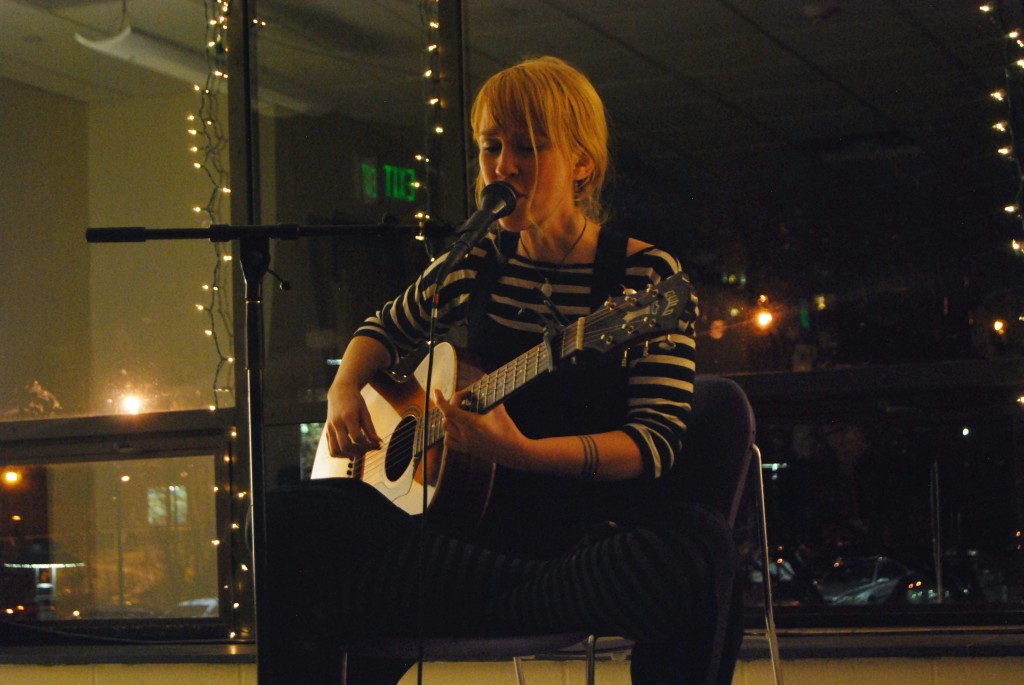On Dec. 6, Binghamton Underground Music Presents (BUMP) invited singer-songwriters Mitski and Johanna Warren to share their music with an intimate crowd of students. In a dimly lit classroom on the upper floor of the Old University Union, the two artists flooded the modest venue with sincere and passionate vibrations emanating from both guitar and vocal chords.
When experiencing an artist perform live, there is a profoundly penetrating conversation between artist and individual. The initial notes grab your attention like a heartfelt “hello” as lyrics initiate a discussion. Melodies interact with memories, stirring emotions and reactions that further fuel the performance. This intermingling of melodic motifs, individual experiences and shared energy encourages the growth of unique thought, like a late-night philosophical chat with an old friend after a few drinks. A similarly amicable atmosphere filled the room as Warren, in her soothingly gentle manner of speaking, kindly asked the audience to make themselves at home cross-legged on the floor.
After taking up her guitar and relieving any residual tension with a few laughable quips, Warren engaged the crowd with melancholic chord progressions and a notable command over her vocal intonations. Persuasive vocal melodies combined with nimble finger picking left audience members vulnerable to her tangibly somber lyrics recalling moments of pain and sorrow from past relationships; the daunting uncertainty Warren exuded during “My Storm” resulted in an extended silence amongst the crowd after the final iteration of its chorus.
Warren admitted that her music career has been an arduous process of self-discovery. She hopes that her listeners will embark on a similar journey.
“I want to encourage everyone to look deep within themselves to find their authentic self,” Warren said.
Breanna Jacobs, a sophomore majoring in art, said she felt Johanna’s soothing vocals throughout her entire performance.
“I love her tonal ranges,” Jacobs said. “It was just so relaxing, and her message was clear and powerful.”
Following her performance, Warren joined the audience on the floor. Meanwhile, Mitski tuned her guitar in preparation for a fiercer, punk-influenced display of musical dexterity. Her voice resonated boldly and honestly. Her chords struck with clear confidence. Mitski’s confessions of ambitiously rebellious desires in “Townie” were as electric and powerful acoustically as it would be if backed by a live band.
The recent SUNY Purchase graduate brings her performances to life with a strong-willed individualistic attitude toward the journey for personal maturity. As she performed “First Love/ Late Spring,” Mitski’s lyrics assured the crowd that even after presenting a facade of maturity throughout our teenage years, it’s understandable to feel immature emotions as an adult. However, before her last piece, Mitski implored the crowd to educate themselves if they ever wish to make a change in their lives and those that surround them. She referenced the recent events in Ferguson, Missouri to illustrate her message.
“I want everyone to acknowledge what’s going on, to read the facts,” Mitski said. “You guys are safe here, but we still need to figure out what the fuck to do.”
The moment after Mitski’s final song, applause reverberated within the Old University Union classroom and overflowed into the halls. The crowd stuck by for quite some time after the show to discuss their favorite songs and for a chance to speak personally with Mitski and Warren.
It is this sort of unifying experience that BUMP, a subset of the Student Association Programming Board, brings to the forefront of campus culture. The organization has delivered a considerable number of unique sounds to the music fanatics of Binghamton University, including the dance-provoking synths of Rubblebucket and the psychedelic rock of King Gizzard and The Lizard Wizard. According to Stephanie Zagreda, vice president for programming, BUMP aims to sustain an appreciation for community by encouraging students to express their tastes in an intimate venue.
“I think a lot of culture gets lost in the business of campus life,” Zagreda said. “That’s why it’s important for students to unite in one experience.”



